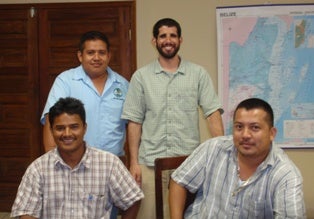
Catch shares team in Belize from Environmental Defense Fund, Wildlife Conservation Society, and Belize Fisheries Department.
“Fish Forever” – the motto of Belize’s fishermen. Last week the Government of Belize in partnership with Environmental Defense Fund (EDF) took a major step towards fulfilling that vision with a vote by Belize’s cabinet to authorize the implementation of catch shares in its network of marine protected areas.
“Belize’s decision will protect the country’s magnificent Mesoamerican Reef and promote the vitality of its fishing industry,” said Larry Epstein, Mesoamerican Reef Program Manager for EDF, “This substantially adds to the growing list of successful conservation measures Belize is using to preserve its oceans for future generations.”
As a first step, the Belize Fisheries Department will implement their design for TURFs and catch limits for spiny lobster in 2011 and 2012 in Glover’s Reef and Port Honduras Marine Reserves. Belize has already taken the first steps for allocating access to TURFs, creating a monitoring regime, and creating committees of fishermen to participate in the implementation and management of catch shares.
“Catch shares will assist in enforcing marine laws and ensure that fishermen are part and parcel of the enforcement, and respected as custodians because it will be part of their livelihoods that they will be protecting.”
– Hon. Rene Montero, Belize Minister of Agriculture, Fisheries and Cooperatives
In 2009 EDF created a partnership between the Government of Belize Fisheries Department, Wildlife Conservation Society, and the leading Belizean conservation NGO – the Toledo Institute for Development and Environment (TIDE). Our coalition achieved this milestone in Belize through an education campaign that engaged fishermen, policy makers, elected officials, and government managers of marine reserves. EDF’s team of economists, scientists, and catch shares experts built Belize’s technical capacity for catch shares and helped develop the catch share design – including Rod Fujita, Kate Bonzon, Laura Rodriguez, Jake Kritzer, Doug Rader, Tom Lalley, and Tesia Love. The Government of Belize has stated a vision for catch shares in all marine reserves, and for the commercial lobster fishery.
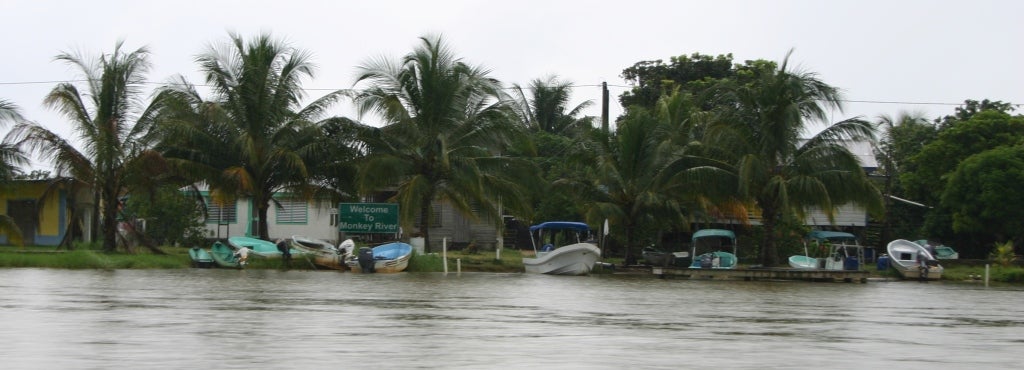
Monkey River Fishing Boats in Belize
Fishermen in Belize understand first-hand and have been advocating catch shares since EDF, WCS, and TIDE began working in their communities. According to one fisherman from Placencia, a fishing community in southern Belize, “Every year for the past ten years we have had a decline in lobster production. That is due to, I think, to overfishing and a general decline in product itself.” Now Belize and its fishermen have a tool at their disposal that protects its oceans, while at the same time supporting the livelihoods and food security for the people that depend on its resources.
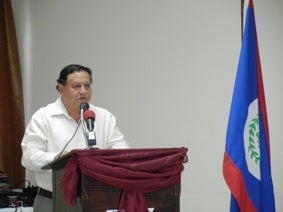


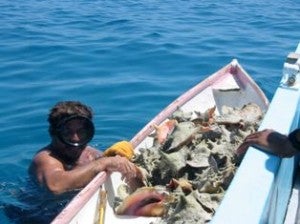
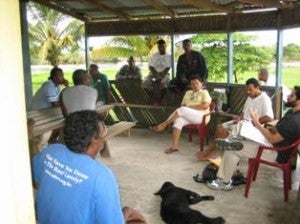
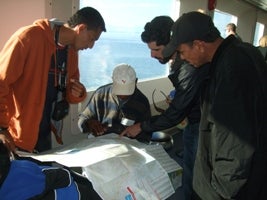 Several times a year, EDF takes a delegation of fishermen, policy makers and other leaders in the ocean conservation community and fisheries industry to British Columbia to see, first hand, an effective catch shares program at work. Last week, Larry Epstein, Ayelet Hines, Michael Clayton, and Nicanor Requena of the EDF Oceans program hosted a delegation of fisheries stakeholders from Belize on an international exchange to visit the B.C. groundfish fishery.
Several times a year, EDF takes a delegation of fishermen, policy makers and other leaders in the ocean conservation community and fisheries industry to British Columbia to see, first hand, an effective catch shares program at work. Last week, Larry Epstein, Ayelet Hines, Michael Clayton, and Nicanor Requena of the EDF Oceans program hosted a delegation of fisheries stakeholders from Belize on an international exchange to visit the B.C. groundfish fishery.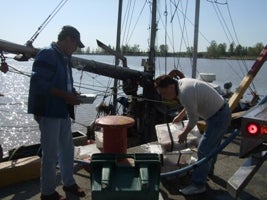 Some of the fisheries managed by catch shares in the B.C. groundfish fishery have increased in value ten-fold as a result of healthier and improved fish stocks and habitat. During the conversations among B.C. and Belizean government managers, fishermen, and conservationists, the delegation learned how the B.C. catch share evolved and discussed lessons learned. In addition, the delegation visited the catch shares monitoring facility and observed the process of assessing and recording the catch at a dockside offload site.
Some of the fisheries managed by catch shares in the B.C. groundfish fishery have increased in value ten-fold as a result of healthier and improved fish stocks and habitat. During the conversations among B.C. and Belizean government managers, fishermen, and conservationists, the delegation learned how the B.C. catch share evolved and discussed lessons learned. In addition, the delegation visited the catch shares monitoring facility and observed the process of assessing and recording the catch at a dockside offload site.